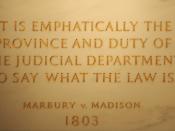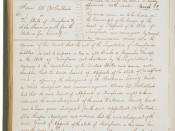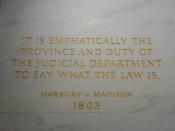During the early days of United States of America, there were people who believe the states should had supremacy over the national government and those who oppose them. Those that oppose them were the people who believed in federalism or the supremacy of the national government. One of these people was John Marshall, the supreme court justice. In many ways, he "tip the scales in favor of the national government's supremacy over the states." He tip the scales by overruling and reducing the states decisions and expanded congressional and Supreme court powers.
First, he overruled the states' decisions or propositions. In one of the his famous cases, he simply overruled the power of the states. It was the Martin v. Hunter's Lessee case. The Supreme court decision to override Virginia's decision was following the Supremacy clause. As a result, states decision were overruled. Another case which was looked at but was not overruled was Virginia v.
Cohens. Marshall said that the Supreme court had jurisdiction to review state criminal proceedings, so he did. Although the Cohens punishments were still based on those of Virginia's law, this shows the possibility of the Supreme court overruling the states. Also, Dartmouth College v. Woodward was also important. Its result were that charters for the college cannot be amended or revoked by states, reducing the state power. Therefore, Marshall overruled and reduced state power.
Then he simply increased Supreme court powers. Many cases show this aspect of his actions. One of these was McCulloch v. Maryland, which granted the power of the national government to make a national bank and that it cannot no be taxed by the states. Gibbons v. Ogden ended in the decision that the affair on "commerce," including water navigation, was a congressional power, not state. Some other...


